Seven Fordham Law professors have been named newly established Distinguished Scholars in recognition of their outstanding contributions. Six faculty members have received the honor of Distinguished Research Scholar for their intellectual leadership and commitment to rigorous scholarship that expands the knowledge of the law, shapes legal debate and sheds light on complex issues. In addition, Professor Leah Hill has been honored as a distinguished clinical scholar in recognition of her excellence in clinical education and her long record of outstanding service to Fordham Law School and to the community.
These new recognitions honor superlative members of the Fordham Law community, including five brilliant faculty members who have passed away: Professors Maria Marcus, Ann Moynihan, Gail Hollister, Joel Reidenberg, and Deborah Batts, as well as two prominent alumni, Eunice Hunton Carter and Robert L. Levine.
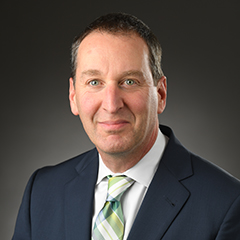 Professor Howard M. Erichson, the new Maria L. Marcus Distinguished Research Scholar, is one of the nation’s most important thinkers about complex litigation and is a coauthor of the leading casebook on complex litigation and a new casebook on civil procedure, among other written works. He joined Fordham Law in 2008 and teaches civil procedure, complex litigation, professional responsibility, and torts. Maria L. Marcus was a beloved member of the faculty for 33 years and the second female tenured professor at the Law School. She was a brilliant oral advocate who argued and won six cases before the U.S. Supreme Court and then dedicated herself to passing her skills on to more than a generation of Fordham Law students as the advisor and guiding light to Fordham’s moot court program.
Professor Howard M. Erichson, the new Maria L. Marcus Distinguished Research Scholar, is one of the nation’s most important thinkers about complex litigation and is a coauthor of the leading casebook on complex litigation and a new casebook on civil procedure, among other written works. He joined Fordham Law in 2008 and teaches civil procedure, complex litigation, professional responsibility, and torts. Maria L. Marcus was a beloved member of the faculty for 33 years and the second female tenured professor at the Law School. She was a brilliant oral advocate who argued and won six cases before the U.S. Supreme Court and then dedicated herself to passing her skills on to more than a generation of Fordham Law students as the advisor and guiding light to Fordham’s moot court program.
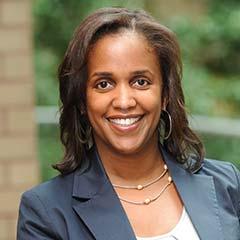 Professor Leah Hill, the newly named Ann Moynihan Distinguished Clinical Scholar, has spent more than 30 years in legal representation, advocacy, teaching, and community engagement focused on protecting the rights and well being of marginalized families. She joined Fordham’s clinical faculty in1996 and has taught clinics in the area of family law, special education and child welfare as well as seminars and classes in those fields. Professor Hill draws on interdisciplinary approaches to family law problems. She has used her scholarship to give voice to the injustices faced by the families she serves, from bias in the courts to disparities in education. Ann Moynihan was a brilliant lawyer and teacher who was a member of Fordham’s clinical faculty from 1995 to 2007 and also served as Associate Dean for Administration. Between her work at Fordham and her earlier role as a supervising attorney at The Legal Aid Society, Professor Moynihan had a deep influence on hundreds of lawyers, many of whom continue to represent low income and marginalized clients.
Professor Leah Hill, the newly named Ann Moynihan Distinguished Clinical Scholar, has spent more than 30 years in legal representation, advocacy, teaching, and community engagement focused on protecting the rights and well being of marginalized families. She joined Fordham’s clinical faculty in1996 and has taught clinics in the area of family law, special education and child welfare as well as seminars and classes in those fields. Professor Hill draws on interdisciplinary approaches to family law problems. She has used her scholarship to give voice to the injustices faced by the families she serves, from bias in the courts to disparities in education. Ann Moynihan was a brilliant lawyer and teacher who was a member of Fordham’s clinical faculty from 1995 to 2007 and also served as Associate Dean for Administration. Between her work at Fordham and her earlier role as a supervising attorney at The Legal Aid Society, Professor Moynihan had a deep influence on hundreds of lawyers, many of whom continue to represent low income and marginalized clients.
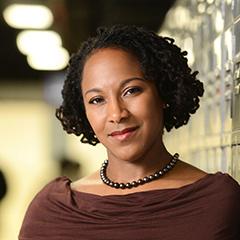 A leader in the areas of law and biomedical ethics, health law, anti-discrimination law, and race and the law, Professor Kimani Paul-Emile has been designated as the Robert L. Levine Distinguished Research Scholar. Levine graduated from Fordham Law in 1926 and established the firm Walsh & Levine. Paul-Emile is the moderator of the lecture series named after Robert L. Levine. Past Levine lecturers include U.S. Supreme Court Justice Sonia Sotomayor and former Canadian Supreme Court Justice Rosalie Silberman Abella. Paul-Emile joined the Law School in 2007. Professor Paul-Emile is the associate director of the Center on Race, Law & Justice and faculty co-director of the Fordham Law’s Stein Center for Law & Ethics.
A leader in the areas of law and biomedical ethics, health law, anti-discrimination law, and race and the law, Professor Kimani Paul-Emile has been designated as the Robert L. Levine Distinguished Research Scholar. Levine graduated from Fordham Law in 1926 and established the firm Walsh & Levine. Paul-Emile is the moderator of the lecture series named after Robert L. Levine. Past Levine lecturers include U.S. Supreme Court Justice Sonia Sotomayor and former Canadian Supreme Court Justice Rosalie Silberman Abella. Paul-Emile joined the Law School in 2007. Professor Paul-Emile is the associate director of the Center on Race, Law & Justice and faculty co-director of the Fordham Law’s Stein Center for Law & Ethics.
 Professor John Pfaff has been recognized as the Joel Reidenberg Distinguished Research Scholar. He is one of the most influential current voices on reforming the criminal enforcement system and is helping shape academic discourse and policy choices across the nation. Professor Pfaff’s groundbreaking research has changed our understanding of the causes of mass incarceration, and is explored thoroughly in his book Locked In. Pfaff joined the Fordham faculty in 2005 and teaches criminal law, sentencing law, and data for lawyers. Joel Reidenberg was also a pioneering scholar. He was one of the first to recognize the fundamental shifts in our legal system brought about by the revolution in information technology. As one of the founders of the field of information law, he established Fordham’s Center of Law and Information Policy, which continues as a leading program in the field.
Professor John Pfaff has been recognized as the Joel Reidenberg Distinguished Research Scholar. He is one of the most influential current voices on reforming the criminal enforcement system and is helping shape academic discourse and policy choices across the nation. Professor Pfaff’s groundbreaking research has changed our understanding of the causes of mass incarceration, and is explored thoroughly in his book Locked In. Pfaff joined the Fordham faculty in 2005 and teaches criminal law, sentencing law, and data for lawyers. Joel Reidenberg was also a pioneering scholar. He was one of the first to recognize the fundamental shifts in our legal system brought about by the revolution in information technology. As one of the founders of the field of information law, he established Fordham’s Center of Law and Information Policy, which continues as a leading program in the field.
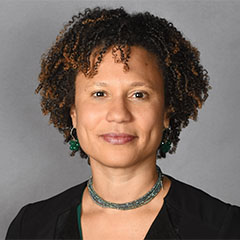 Professor Catherine Powell, the Eunice Hunton Carter Distinguished Research Scholar, is a leading expert on questions at the intersection of human rights and civil rights. Her recent work focuses on matters concerning belonging and inclusion and how race, gender and poverty are used to roll back the rights of marginalized people. She coined the term “Color of Covid” through a series of CNN op-eds and a Yale Journal of Law and Feminism law review article. Powell joined Fordham Law in 2003 and teaches constitutional law, civil rights and civil liberties in a digital age, human rights, and feminist theory. She is the moderator of the Eunice Hunton Carter lecture series, named for one of Fordham Law’s most distinguished alumnae. Eunice Carter’s grandson is Yale Law Professor Stephen Carter, and her own grandparents were enslaved. She became the first Black woman assistant district attorney in the state of New York. The lecture series, established in 2022, brings leading scholars in the field of racial justice to Fordham. Past lecturers include Nikole Hannah-Jones and Dorothy Roberts.
Professor Catherine Powell, the Eunice Hunton Carter Distinguished Research Scholar, is a leading expert on questions at the intersection of human rights and civil rights. Her recent work focuses on matters concerning belonging and inclusion and how race, gender and poverty are used to roll back the rights of marginalized people. She coined the term “Color of Covid” through a series of CNN op-eds and a Yale Journal of Law and Feminism law review article. Powell joined Fordham Law in 2003 and teaches constitutional law, civil rights and civil liberties in a digital age, human rights, and feminist theory. She is the moderator of the Eunice Hunton Carter lecture series, named for one of Fordham Law’s most distinguished alumnae. Eunice Carter’s grandson is Yale Law Professor Stephen Carter, and her own grandparents were enslaved. She became the first Black woman assistant district attorney in the state of New York. The lecture series, established in 2022, brings leading scholars in the field of racial justice to Fordham. Past lecturers include Nikole Hannah-Jones and Dorothy Roberts.
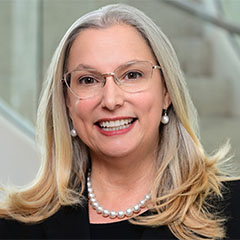 Professor Linda Sugin, who joined Fordham Law in 1994, has been honored as the Gail D. Hollister Distinguished Research Scholar. Sugin served as Associate Dean for Academic Affairs from 2017-2021 and is the founder and faculty director of Fordham’s groundbreaking Office of Professionalism. She teaches Federal Taxation, Tax Policy, Nonprofit Organizations, Peer Mentoring and Leadership, and Quantitative Methods for Lawyers. Sugin was the 2021 recipient of the Dean’s Medal of Achievement and the 2007 recipient of Fordham Law School’s Teacher of the Year Award. Her scholarly interests focus on issues of distributive justice in taxation and the governance of nonprofit organizations. Gail Hollister ’70 was the second woman to hold tenure on the Fordham Law faculty and served on the faculty for 40 years. She also held key leadership roles as director of the student affairs, legal writing and the school’s first associate dean of administration.
Professor Linda Sugin, who joined Fordham Law in 1994, has been honored as the Gail D. Hollister Distinguished Research Scholar. Sugin served as Associate Dean for Academic Affairs from 2017-2021 and is the founder and faculty director of Fordham’s groundbreaking Office of Professionalism. She teaches Federal Taxation, Tax Policy, Nonprofit Organizations, Peer Mentoring and Leadership, and Quantitative Methods for Lawyers. Sugin was the 2021 recipient of the Dean’s Medal of Achievement and the 2007 recipient of Fordham Law School’s Teacher of the Year Award. Her scholarly interests focus on issues of distributive justice in taxation and the governance of nonprofit organizations. Gail Hollister ’70 was the second woman to hold tenure on the Fordham Law faculty and served on the faculty for 40 years. She also held key leadership roles as director of the student affairs, legal writing and the school’s first associate dean of administration.
 Professor Julie Suk has been named the Honorable Deborah A. Batts Distinguished Research Scholar. Suk joined the faculty in 2021. She is an internationally recognized interdisciplinary and comparative legal scholar, researching equality at the intersection of law, history, sociology, and politics in the United States and globally. She is the author of two books, We the Women: The Unstoppable Mothers of the Equal Rights Amendment (2020) and After Misogyny: How the Law Fails Women and What to Do about It (2023) and dozens of scholarly articles and book chapters. She has been awarded a fellowship at the Russell Sage Foundation for 2023-24, where she is working on her next book about constitutional amendment. Deborah A. Batts was the Law School’s first tenured Black faculty member and a renowned U.S. District judge. While she was on the full time faculty, Judge Batts taught property and family law. After joining the bench in 1994, she continued to teach trial advocacy to more than a generation of students.
Professor Julie Suk has been named the Honorable Deborah A. Batts Distinguished Research Scholar. Suk joined the faculty in 2021. She is an internationally recognized interdisciplinary and comparative legal scholar, researching equality at the intersection of law, history, sociology, and politics in the United States and globally. She is the author of two books, We the Women: The Unstoppable Mothers of the Equal Rights Amendment (2020) and After Misogyny: How the Law Fails Women and What to Do about It (2023) and dozens of scholarly articles and book chapters. She has been awarded a fellowship at the Russell Sage Foundation for 2023-24, where she is working on her next book about constitutional amendment. Deborah A. Batts was the Law School’s first tenured Black faculty member and a renowned U.S. District judge. While she was on the full time faculty, Judge Batts taught property and family law. After joining the bench in 1994, she continued to teach trial advocacy to more than a generation of students.




